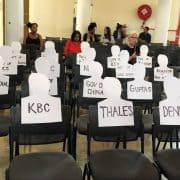|
Getting your Trinity Audio player ready...
|
By Kwazi Dlamini
The People’s Tribunal on Economic Crime commenced at Constitution Hill in Johannesburg on 3 February. On 6 February the Corruption Watch team made submissions to the tribunal regarding its legal challenge, with the Right2Know Campaign, to the findings of the Seriti Commission into arms deal corruption.
The tribunal is organised by various organisations including the Public Affairs Research Institute, Corruption Watch, the Centre for Applied Legal Studies, the Right2Know Campaign, Open Secrets, and the Foundation for Human Rights. Leading up to the tribunal, Open Secrets released Joining the Dots, a report that shows the timeline of events of corruption, and how they are interlinked, from the apartheid regime to the current democratic South African government.
The report reveals, among others, how big corporates offer bribes to capture government officials to receive monetary benefits or tenders worth billions of rands. The report also reveals that the various individuals involved in state capture may have changed but their operations are much the same as those prior to 1994.
Below is a summary of findings for the three main focus areas.
1974 to 1994
The report reveals that between those years the apartheid government spent almost R500-billion on weapons and technology to carry on its oppression. It reveals that even though the UN had prohibited other countries from selling arms to the apartheid regime, billions of rands still left South Africa to pay foreign arms companies for guns and bombs.
The South African government worked with international banks and the South African Reserve Bank, which was responsible for signing off money for arms out of South Africa. Armscor, the company responsible for buying weapons, worked with Belgian banks to break the UN restriction. “The bank deliberately conspired with apartheid officials to build a network of bank accounts and shell companies that would help obscure the trade,” the report notes.
1999 arms deal
In 1996, the South African government decided that it wanted to modernise its military equipment. However, Parliament argued that public spending must benefit the poor people of South Africa rather than European arms companies.
The White Paper on National Defence, presented to Parliament in 1996, was a draft of incorporated comments submitted by political parties, non-governmental organisations, the defence industry, defence analysts, and members of the public and the South African National Defence Force. The white paper acknowledged that there was no military threat in South Africa. It suggested that socio-economic development take precedence over military spending because the biggest threat to the country’s security was poverty and unemployment.
Still, then minister of finance Trevor Manuel signed the loan agreement of almost R30-billion rands – we will be paying the loan until 2020 and with interest and other charges, it can amount to between R61-billion and R72-billion rands of public money.
The arms deal was hindered by corruption and fraud, and the all-European companies who got the tender to supply arms never delivered their part of the deal of creating chances of employment to South Africans.
State capture
State capture has become a centre of debate in South African politics; the Joining the Dots report tells how powerful individuals control government and state-owned enterprises (SOEs) for personal gains and self-enrichment.
It discusses how the Gupta family summoned ministers of the state to their Saxonworld home to give them orders, and how ministers who refused to play ball were threatened, allegedly by the Gupta family. It articulates how SOEs are weakened because qualified and skilled leaders are removed to make way for those who will do as told, despite being unskilled for the job.
It also exposes how private companies like Trillian and McKinsey as well as the state-owned Denel illegally benefited from state capture.
For the full report visit https://corruptiontribunal.org.za/joiningthedots/







